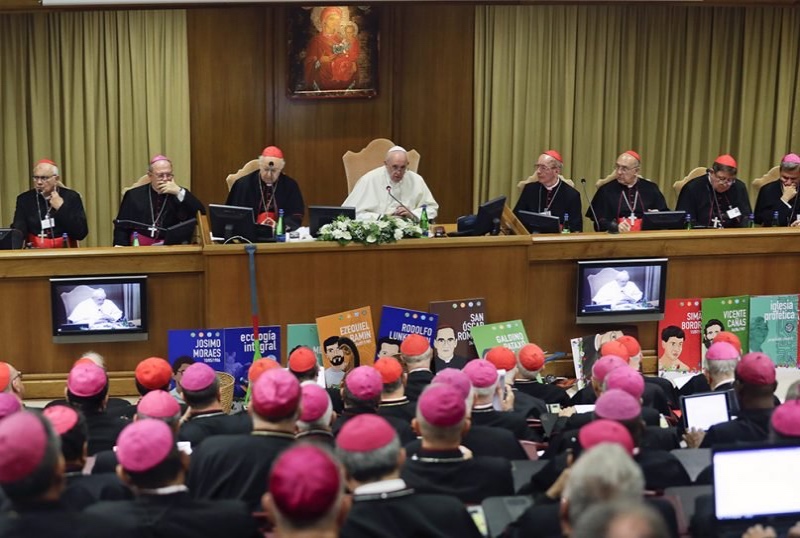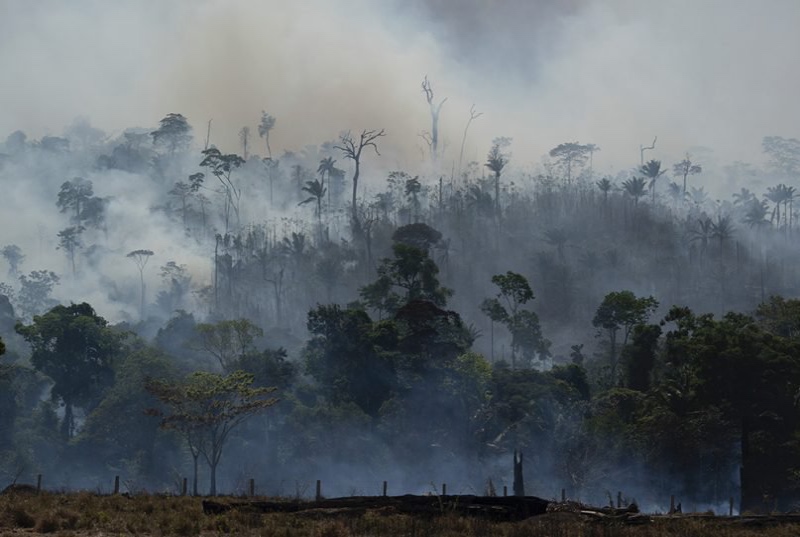Vatican City
RNS
As the 185 Catholic bishops who met to discuss the Amazon region broke into small working groups for the second week of the synod, the topics they would tackle included dwindling vocations, the role of women and married men in the church and the rights of Indigenous peoples. But if the small-group participants agreed on the problems, the reports from the “circoli minori” showed how wide a difference there was in approaches to possible solutions.
The ideas generated by the 12 groups, which divided the bishops and the synod’s lay and religious participants according to language, will be presented to Pope Francis as recommendations, said Father Giacomo Costa, who heads the Vatican’s Information Commission, at a press briefing Friday, emphasising that the “synod is not a deliberative organism”.

The Pope will have plenty of food for thought. With the goal being to provide the sacraments and a greater pastoral presence in the Amazon, the groups urged Francis to consider everything from the ordination of women as deacons, who may preach but not perform sacraments, to the creation of a separate rite for the region, like those in the Eastern Church that allow priests to be married.
“It’s obvious that the debate and discussion are open, we try to listen to the differences because everyone has something important to say,” said Costa.
Here is a roundup of the ideas the groups discussed in the synod’s second week:
Growing attention to the role of women
According to Colombian Capuchin Sister Daniela Adriana Cannavina, “attention toward [the role of] women grew as the synodal work proceeded,” which was reflected in attention dedicated to the topic in the small-group reports.
“It’s time to answer the need to renew our presence in the Amazon context,” she told reporters at the conference. “We must give women a more consolidated role.”
In their report, Portuguese group A called the need for new ordained ministers “necessary and urgent,” especially taking into consideration the “debt” the Catholic Church owes the Amazon region for its role in past and recent colonisation.
“We ask the Holy Father to allow the ordination of men to priestly ministry and women to the diaconate,” especially for “respected and recognised” members of the Indigenous communities regardless of whether they are married or have a family, the Portuguese group wrote in what was the most hard-hitting section of the report on the topic of ordination.
“This way,” they added, “we will give a feminine and maternal face to the Church.”
Spanish group A also supported women deacons, especially in light of the overrepresentation of women in the Amazon. “There are still discrimination against the feminine world reflected in the decision-making spaces of the Church,” its report said.
The Italian group called for allowing women to have access to lay ministries, given “adequate formation and preparation”.
Bishops from the Amazon region instead called on the Holy See to create new ministries that would draw on existing community leaders, whether male or female.
While agreeing with the basic issues driving the other groups’ ideas for the role of women in the church, other groups (particularly Spanish and Portuguese speakers) insisted that more “reflection and deepening” are needed and encouraged “further study on this matter by looking primarily at future possibilities, rather than ancient history.”
A new ‘Amazonian rite’
Discussions on whether to ordain already married men in the Amazon region have been front and centre during this synod, even as some bishops have objected that the move could set a dangerous precedent for the entire church.
For Italian group B, the solution may lie in an “Amazonian Rite”, which would join other rites that already exist within the Catholic Church that not only recognise a tradition of married priests but celebrate their faith in a way that reflects their heritage, culture and beliefs.
Citing the Catholic Byzantine rite, largely observed in Eastern Europe, Archbishop Rino Fisichella, president of the Pontifical Council for New Evangelization, said, “Rites are an expression of evangelization. When the announcement of the Gospel reaches a culture, it’s enculturated, meaning it attempts to express itself in forms that that culture finds to be most coherent to express that ministry.”
The Portuguese group B acknowledged that the ordination of trusted married men, known in the church as “viri probati”, “is considered necessary for the pan-Amazon region”, but their report stipulated that local bishops should determine the wisdom of such ordinations, case by case.
Some in the Spanish group were also open to the viri probati “on an exceptional basis, under specific circumstances and for certain specific peoples, clearly establishing the reasons that justify it”, but others believed the topic “should be studied and defined in a specific Synod Assembly”.

Fire consumes the Amazon rainforest in Altamira, Brazil, on 27th August. Fires across the Brazilian Amazon have sparked an international outcry for preservation of the world’s largest rainforest. PICTURE: AP Photo/Leo Correa.
Formation, human rights and advocacy in the Amazon
While questions over ordination are a challenge coming from within the church, its community in the Amazon is facing far greater risks from the outside. Pollution, migration, climate change and violence – against both women and the environment – were raised repeatedly in the working groups’ discussions.
“We are concerned with the violence inflicted on women and minors in the Amazon,” wrote Italian group A. “They suffer the most due to the macho culture, the authoritarian behavior and also clericalism, abuse and trafficking.”
The deterioration of the Amazon forest has led many young Indigenous people to migrate to the region’s cities, where the Catholic Church often struggles to offer adequate pastoral care. According to the Italian groups, a solution already exists in Pope Francis’ 2015 encyclical on the environment, Laudato Si, which points to “reestablishing a positive and non-predatory relationship between man and nature”.
But creating sustainable economies does not by itself address the issue of violence, which the Portuguese group described as among the “most nerve-wracking points” in the debate.
“Faced with this reality of blood, the Church proposes to encourage complaints by supporting women,” they wrote in their report. “We propose the creation of a human rights observatory in the Pan-Amazonian territory, or Justice and Peace Commission.”
The Spanish group D took the same position, suggesting the creation of an observatory for human rights using the existing network of Catholic institutions in the Amazon. They also urged the church to strengthen its dialogue with governmental institutions.
The English- and French-speaking groups made no specific proposal but emphasised “that the Amazonian people have great expectations about this synod. We must not let them down”.





